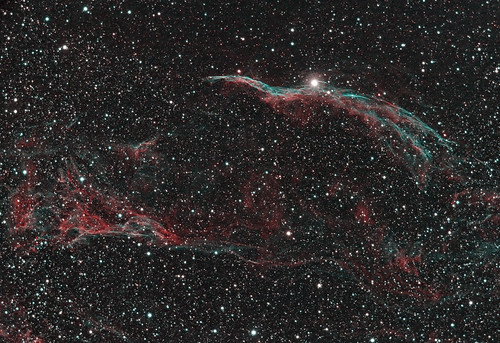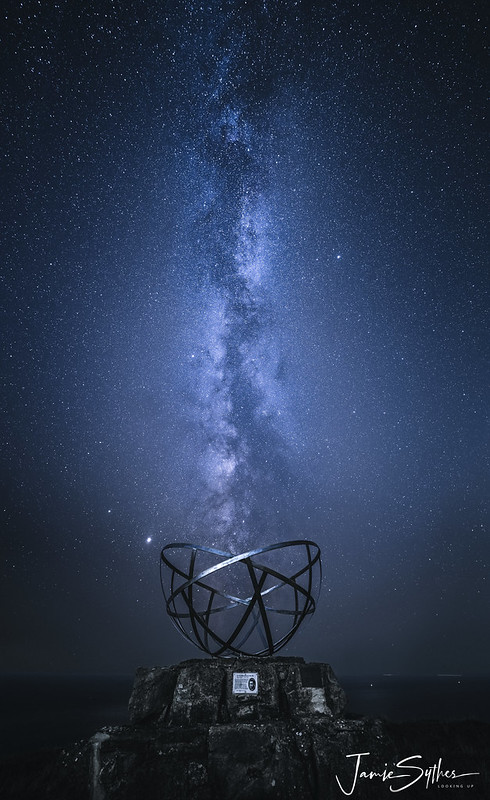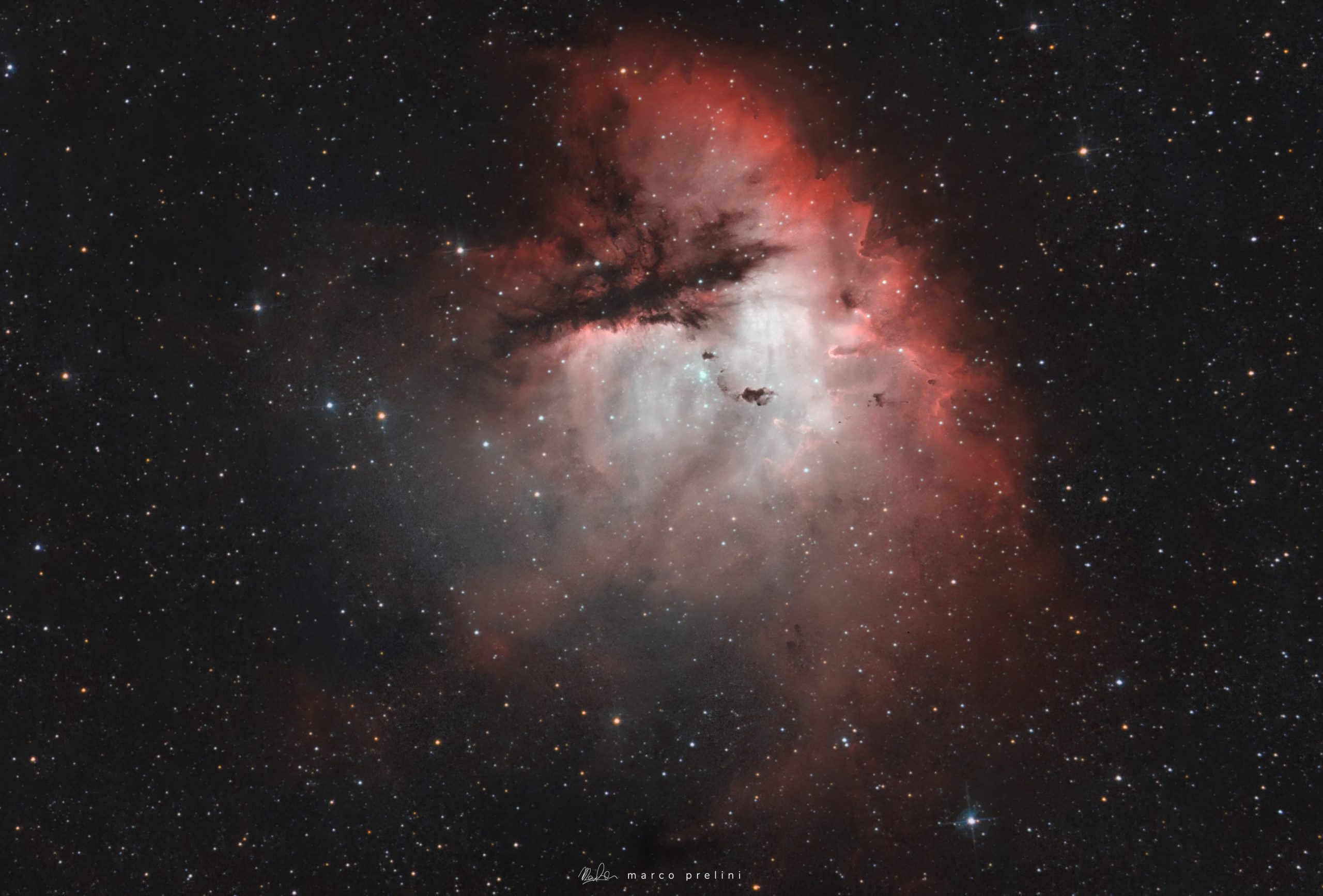Page 3 of 6
Re: Submissions: 2020 September
Posted: Sat Sep 12, 2020 8:25 pm
by Ann
vchari252 wrote: ↑Sat Sep 12, 2020 6:24 pm
Hello! I've been working on this project for almost a month now and I think I'm finally done. It is of the very faint vdB 152 in Cepheus and is my first submission here!

Please see the above link for information considering the capture.
Thanks!
vdb_152_processed_v9 copy.jpg
That's beautiful! What a labor of love!
Thank you and welcome to Starship Asterisk*!
Ann
Re: Submissions: 2020 September
Posted: Sun Sep 13, 2020 5:46 pm
by vchari252
Thank you so much! I updated the image as well too get rid of a color cast I hadn't noticed, so I think it's better now.
Re: Submissions: 2020 September
Posted: Mon Sep 14, 2020 3:31 am
by AstroGabe
The Question Mark Nebula - NGC7822 region
Scope: Astro-Physics 92mm Stowaway @f/5.3
Reducer: Astro-Physics 0.8x telecompressor
Camera: ASI6200MM Pro
Guide Camera: ASI174MM Mini
Mount: Mach1 GTO
SII: 29x15min
Ha: 27x15min
OIII: 36x5min total
Software: Voyager, PHD2, APCC, Pixinsight
23 hrs total exposure
Acquisition and processing: Gabe Shaughnessy
Captured: Aug-Sept 2020
High resolution image:
https://www.astrobin.com/full/mfyqzh/0/
https://cdn.astrobin.com/thumbs/hdcT9dr ... GaXsse.png
Re: Submissions: 2020 September
Posted: Mon Sep 14, 2020 3:50 am
by AstroGabe
The Iris Nebula Region
Details:
Scope: Astro-Physics 92mm Stowaway @f/5.3
Reducer: Astro-Physics 0.8x telecompressor
Camera: ASI6200MM Pro
Guide Camera: ASI174MM Mini
Mount: Mach1 GTO
L: 98x5min
RGB: 27x5min each
Software: Voyager, PHD2, APCC, Pixinsight
14.9 hrs total exposure
Astrobin for more details:
https://www.astrobin.com/rqupy9/B/
Acquisition and processing:
Gabe Shaughnessy
July - August 2020
https://cdn.astrobin.com/thumbs/g9yWNpu ... MSkbH4.png
Re: Submissions: 2020 September
Posted: Mon Sep 14, 2020 3:51 am
by AstroGabe
The Ghost Nebula
Details:
Scope: ONTC1010 f/4 reflector
Coma corrector: Paracorr Type 2
Camera: QSI690-wsg8
Guide Camera: SX Ultrastar
Mount: AP1100
L: 126x3min 1x1 binning
RGB: 18x5min 2x2 binning each
Total exposure: 10.8 hours
Software: Voyager, PHD2, APCC, Pixinsight
Acquisition and processing:
Gabe Shaughnessy
July 2020
Astrobin for more details:
https://www.astrobin.com/eu4yv2/B/

Re: Submissions: 2020 September
Posted: Mon Sep 14, 2020 3:52 am
by AstroGabe
The IC1311 Region
Details:
Scope: Astro-Physics 92mm Stowaway @f/5.3
Reducer: Astro-Physics 0.8x telecompressor
Camera: ASI6200MM Pro
Guide Camera: ASI174MM Mini
Mount: Mach1 GTO
Ha: 3x15min
SII: 4x15min
OIII: 11x15min
Software: Voyager, PHD2, APCC, Pixinsight
4.5 hrs total exposure
Acquisition and processing:
Gabe Shaughnessy
July 2020
Astrobin for more details:
https://www.astrobin.com/a0opb8/C

Re: Submissions: 2020 September
Posted: Mon Sep 14, 2020 3:53 am
by AstroGabe
The Soap Bubble Nebula
Details:
Scope: ONTC1010 f/4 reflector
Coma corrector: Paracorr Type 2
Camera: QSI690-wsg8
Guide Camera: SX Ultrastar
Mount: AP1100
Ha: 14x15min
OIII: 19x15min
Total exposure: 8.2 hours
Software: Voyager, PHD2, APCC, Pixinsight
Astrobin for more details:
https://www.astrobin.com/04wn5n/
Acquisition and processing:
Gabe Shaughnessy
June-July 2020
https://cdn.astrobin.com/thumbs/SKmC4Gj ... GaXsse.png
Re: Submissions: 2020 September
Posted: Mon Sep 14, 2020 3:54 am
by AstroGabe
The Veil Nebula
Details:
Scope: Astro-Physics 92mm Stowaway @f/5.3
Reducer: Astro-Physics 0.8x telecompressor
Camera: ASI6200MM Pro
Guide Camera: ASI174MM Mini
Mount: Mach1 GTO
Ha: 11x15min
OIII: 7x15min
Software: Voyager, PHD2, APCC, Pixinsight
4.5 hrs total exposure
Acquisition and processing:
Gabe Shaughnessy
July 2020
Astrobin for more details:
https://www.astrobin.com/w229ek/?nc=user
https://cdn.astrobin.com/thumbs/OQLX6eZ ... GaXsse.png
Re: Submissions: 2020 September
Posted: Mon Sep 14, 2020 11:53 am
by barretosmed
JUPITER, IO, EUROPA AND CALLISTO
Best details:
https://www.astrobin.com/full/7vq4rr/B/?nc=user
Equipment
MEADE LX200 10 "UHTC
ZWO Optical ASI 462 MC
Filter: Planetary Baader L 1.25 "
Accessory: TeleVue Powermate 2.0x
Mounting: Ioptron Cem60
Polar alignment: Sharcap
Capture: SharpCap V3.0
Processing: Photoshop CS6, AutoStakkert AutoStackert !, Registax 6
Seeing: 3
Transparency: 7
2020/09/13
23:13 UT
São Paulo-SP-BRAZIL
Copyright: Fernando Oliveira de Menezes
Email:
Barretsomed@hotmail.com
Re: Submissions: 2020 September
Posted: Mon Sep 14, 2020 5:25 pm
by gorante
NGC 281 Pacman
https://astro.digitalcurse.com
By: Marco Prelini
It's time for the Pacman again

Located in the northern part of Cassiopeia constellation, this nebula is a rich HII region populated by Bok globules (which are newborn stars nursery), an open cluster and a multiple (five stars) system.
Due to his shape si also known as “The Pacman Nebula”, just look ad the brightest part and you’ll understand why

For who's interested in technical specs, here they are:
Shooting Data
– HA+OIII (HOO) composition
– 37 600″ HA Light frames at -0°C / gain 120
– 36 600″ OIII Light frames at -0°C / gain 120
– 31 dark/flat/darkflat frames
– ASI 294MC pro camera
– Skywatcher AZEQ6
– Skywatcher 200/1000 PDS
Frames captured between end of August / first of September 2020 from my backyard
Bortle 8 / SQM 18.5 heavy light polluted sky
Postproduction made with PixInsight for image stacking and Photoshop/Camera raw for the color balancing and noise reduction.
HiRes on Astrobin:
https://www.astrobin.com/5bwdd5/
Re: Submissions: 2020 September
Posted: Mon Sep 14, 2020 5:43 pm
by Ann
gorante wrote: ↑Mon Sep 14, 2020 5:25 pm
NGC 281 Pacman
https://astro.digitalcurse.com
By: Marco Prelini
It's time for the Pacman again

Located in the northern part of Cassiopeia constellation, this nebula is a rich HII region populated by Bok globules (which are newborn stars nursery), an open cluster and a multiple (five stars) system.
Due to his shape si also known as “The Pacman Nebula”, just look ad the brightest part and you’ll understand why

For who's interested in technical specs, here they are:
Shooting Data
– HA+OIII (HOO) composition
– 37 600″ HA Light frames at -0°C / gain 120
– 36 600″ OIII Light frames at -0°C / gain 120
– 31 dark/flat/darkflat frames
– ASI 294MC pro camera
– Skywatcher AZEQ6
– Skywatcher 200/1000 PDS
Frames captured between end of August / first of September 2020 from my backyard
Bortle 8 / SQM 18.5 heavy light polluted sky
Postproduction made with PixInsight for image stacking and Photoshop/Camera raw for the color balancing and noise reduction.
HiRes on Astrobin:
https://www.astrobin.com/5bwdd5/
Hi Marco and welcome to Starship Asterisk*!
That's a beautiful picture of the Pacman Nebula! I particularly appreciate the colors!

Ann
Re: Submissions: 2020 September
Posted: Mon Sep 14, 2020 6:13 pm
by barretosmed
Jupiter - watching small flake inside the red spot
Spots on planets are common events to observe, it is a happiness for those who capture. Here in this image I managed to capture an event inside the red spot, a “small flake”
These spots are caused by internal or external events, in the case of the big red spot, they can last from seconds to hours or days. Due to its size, it will not affect the characteristics of the Great Red Spot, as happened recently (
https://skyandtelescope.org/astronomy-n ... our-scope/).
We will follow up to see the evolution and see images of other amateur astronomers to see how it behaves
More details
https://www.astrobin.com/dkrt80/?nc=user
Equipment
MEADE LX200 10 "UHTC
ZWO Optical ASI 462 MC
Filter: Planetary Baader L 1.25 "
Accessory: TeleVue Powermate 2.0x
Mount: Ioptron Cem60
Polar alignment: Sharcap
Capture: SharpCap V3.0
Processing: Photoshop CS6, AutoStakkert AutoStackert !, Registax 6
9/13/20
23:13 UT
São Paulo-SP-BRASIL
Copyright: Your name
On a plot of Cassiopea
Posted: Mon Sep 14, 2020 7:34 pm
by alcarreño
Copyrights: Asociacion Astronomica de Ocentejo
 Cassiopea al 50%
Cassiopea al 50% by
Raul Villaverde, en Flickr
Re: Submissions: 2020 September
Posted: Mon Sep 14, 2020 7:55 pm
by gorante
Ann wrote: ↑Mon Sep 14, 2020 5:43 pm
Hi Marco and welcome to Starship Asterisk*!
That's a beautiful picture of the Pacman Nebula! I particularly appreciate the colors!

Ann
Thank you Ann!

Re: Submissions: 2020 September
Posted: Tue Sep 15, 2020 7:01 pm
by a.carrozzi
NGC 6914 is a group of reflection nebulas inside the large HII region around the star Sadr, in the Cygnus constellation.
Technical data
Telescope: SkyWatcher Newton 200/1000
Mount: SkyWatcher NEQ 6 Pro
Camera: Atik 4000 LE
Astrodon LRGB I-series and Baader Ha 7nm. filters
14x600s Ha, 14x420s L, 3x420s for each RGB channel
 NGC 6914
NGC 6914 by
Alessandro Carrozzi, su Flickr
Re: Submissions: 2020 September
Posted: Tue Sep 15, 2020 7:54 pm
by shaunnesy
Lulworth Cove Dorset UK July 19th 2020
40 pane mosaic with Jupiter and Saturn shinning brightly
Re: Submissions: 2020 September
Posted: Wed Sep 16, 2020 7:26 am
by Tom Glenn
ISS transits Mars, September 14, 2020
 ISS reaches out and touches Mars, transit September 14, 2020
ISS reaches out and touches Mars, transit September 14, 2020 by
Tom Glenn, on Flickr
The International Space Station (ISS) transits Mars in this image. This is a single frame exposure of 0.35ms, extracted from a video showing a longer transit sequence (full transit sequence linked below).
https://www.flickr.com/gp/140032790@N06 ... N06/48L18K
Details on both the ISS and Mars are visible, despite the short exposure, including Syrtis Major on Mars. The orbital trajectory was calculated by Calsky.com, and the transit was only visible along a 100m wide corridor along the ground. The angular velocity of the ISS was 2766"/s, and the actual ground velocity was 7.4km/s. The image was captured northeast of San Diego, CA, at 05:15:47 local time (PDT) on Monday, September 14, 2020, and more information and data (including the raw exposure series) is available in the following video linked below:
https://youtu.be/oHcMvF-nP2s
Equipment used:
C9.25 Edge HD telescope
ASI183mm camera (no filter)
Focal length: 2350mm
Exposure: 0.35ms
Gain: 300 (66%)
ROI: 5496x1500 pixels
Frame rate recorded: 41 fps
Re: Submissions: 2020 September
Posted: Wed Sep 16, 2020 11:47 pm
by Paul Haese
This is an image of NGC1316 (AKA Cannibal) which received a shortlisting in Insights Astronomy Photographer of the Year 2020 competition.
The object is a face on giant elliptical galaxy. It displays many merger shells and has apparently just had an encounter with NGC1317 the smaller galaxy near it. Click on the link below for the larger image.
http://paulhaese.net/NGC1316%20AG12.html
Copyright: Paul Haese
Re: Submissions: 2020 September
Posted: Fri Sep 18, 2020 8:11 am
by Kinch
SH2-155 Cave Nebula
Sh2-155 lies at the edge of the Cepheus B cloud (part of the Cepheus molecular cloud), and is ionized by young stars from the Cep OB3 association. It has been suggested that radiation from the hot O-type star HD 217086 is compressing the region, triggering the formation of a new generation of stars. A study of the region's young stellar objects by the Chandra X-ray Observatory and Spitzer Space Telescope shows a progression of stellar ages in front of the cloud, supporting the hypothesis of triggered star-formation.
Further info @
https://www.kinchastro.com/sh2-155---cave-nebula.html
Re: Submissions: 2020 September
Posted: Fri Sep 18, 2020 8:27 am
by macnenia
3 recent images of Mars covering most of the planet's surface.
As Mars approaches opposition, these 3 high resolution amateur planetary images show most of what can be seen of the red planet as it spins on its axis.

- 3 recent images of Mars covering most
Over the last 3 weeks as the aspect of Mars slowly changes each night, I have been lucky enough to have had superb seeing on several occasions and to be able to produce these 3 images that span most of the surface of the planet. See the planetary map also attached.

- Planetary map shows coverage of the 3 images
The first image (top left) was acquired on 28th August. The planet was 18.4 arc secs in apparent diameter and 91% illuminated. This images features the iconic Olympus Mons, the largest volcano in the solar system and the Tharsis Montes, the 3 smaller, yet still massive shield volcanoes in a row Arsia Mons (bottom left), Pavonis Mons (middle) & Ascraeus Mons (upper right).
The second image (top right) was acquired on 5th September and at that time the planet had increased in apparent diameter to 19.6 arc secs and was 93% illuminated. This image features the Vallis Marineris, the largest canyon in the solar system.
The third image (bottom) was captured on 15th September and the apparent diameter had reached 21.0 arc secs and the planet was 96% illuminated. This is one of the most famous aspects of Mars, with Sinus Meridiani, Sinus Sabaeus and Schiaparelli crater to the left, Syrtis Major at the terminator to the right and the gigantic impact crater, the Hellas Basin to its south.
Note the position of the much reduced South Polar Cap in each image. We have seen the cap shrinking dramatically in recent months and now its remnant is offset from the axis of the planet and the SPC can be seen to orbit the true south pole. Note that on the first and third images it is on alternate sides of the polar axis.
Re: Submissions: 2020 September
Posted: Fri Sep 18, 2020 8:47 am
by peter shah
M45 and the Large Molecular Cloud in Taurus Image by Peter Shah 12hours total exposure time Comprising 384x frames with a mix of 300s, 180s and 60s subframes. Processed with Pixinsight, Photoshop and Adobe Lightroom. Equipment used was a 105mm f:1.4 Sigma Lens working at f:2 and the ASI 2600MC Pro OSC camera, Pier 4at Roboscopes based at e-EyE, Extremadura Spain.
Image by Peter Shah
https://www.flickr.com/photos/astropix/ ... ool-apods/
thanks for looking
Re: Submissions: 2020 September
Posted: Fri Sep 18, 2020 11:02 am
by ZBOYDMARK
14.09.20
NGC6960 Western Veil Nebula (Witch’s Broom) and Pickering's Triangle.
 NGC6960 Western Veil Nebula RGBHOO
NGC6960 Western Veil Nebula RGBHOO by
Mark Forbes, on Flickr
RGBHOO process approx 3 hours of data, captured from my backyard in Manchester UK under Bortle 8-9 skies using my Altair Astro 72EDF refractor with x0.8 reducer, and a Altair Astro IMX183 Colour PROTEC (CMOS) Hypercam.
90 mins of RGB using L-Pro-MAX filter and then switched over to using the TRIBAND filter and captured a further 90mins of data.
Ha and OIII mono data extracted from RGB Triband data with Astro Pixel Processor, reintegrated and recombined with the LPro RGB data to generate an RGBHOO integration. Processed with Pixinsight and Photoshop 2020.
EQUIPMENT:
Altair Astro 72EDF refractor (f/6)
AA Lightwave x0.8 reducer fitted
AA IMX183C PROTEC Hypercam
LPROMAX light pollution suppression filter
AA TRIBAND filter (Ha red pixels, and H-beta + Oiii green/blue pixels)
AA 50mm guidscope and AA GPCAM2 130Mono
iOptron CEM25P mount and iPolar alignment camera
AA Portable Pier
CAPTURE SOFTWARE:
SharpCap 3.3Pro Beta
PHD2 Guiding
DATA:
All lights captured at unity gain (398)
Black Level = 24
TEC Temp = -10°C
90x 60sec using the LPRO-MAX Filter
60x Flats (LPro)
45x Darks
60x Dk Flats
32x 180sec using the TRIBAND Filter
60x Flats (triband)
45x Darks
60x Dk Flats
INTEGRATION & PROCESSING:
Astro Pixel Processor 1.080
PixInsight 1.8.8-6 Ripley
Photoshop 2020
Image capture and processing by Mark Forbes
Thanks for looking and your consideration.
Re: Submissions: 2020 September
Posted: Fri Sep 18, 2020 11:34 pm
by barretosmed
Astronomical Encounter - Observing Comet Neowise
Photo taken at the moment when the comet was passing over the horizon, in the image to see observing the comet with the binocular, in the image in the left corner you can see a probable satellite rising.
BEST DETAILS
https://www.astrobin.com/full/v97lme/0/?nc=user
Equipment:
Canon 6D
Canon 50mm 1.8
Iso 100, time 10 sec
Fixed tripod
Processing: Photoshop CS6, Pixinisight
07/23/2020
Munhoz - MG - Brazil
Copyright: Fernando Oliveira de Menezes
Re: Submissions: 2020 September
Posted: Sat Sep 19, 2020 12:37 am
by JSythes
Milky Way core setting over Purbeck Radar Memorial
Taken on 16th of September at St Aldhelm's Head, Jurassic Coast, Dorset, United Kingdom.
The memorial commemorates the radar research carried out at Worth Matravers, during the second world war from 1940-1942 which was crucial to the birth of modern telecommunications.
More information on the Early Radar development at Worth Matravers can be found here:
http://www.purbeckradar.org.uk/index.html
Equipment, Exposure and Processing
Cannon EOS RA, Samyang 14mm F2.8 - 4x 120 seconds tracked sky, 2x 120 seconds foreground - single composition. Stacked in Sequator and edited in Lightroom.
I've submitted two versions - a colour one and also a desaturated one which I feel fits the story of the research better.


Re: Submissions: 2020 September
Posted: Sat Sep 19, 2020 12:18 pm
by Robin_Onderka
Space and Love
Credits: Robin Onderka |
www.instagram.com/robin_onderka
---
Discover the universe together. That's how you could also call this photo, which shows me and my girlfriend on the edge of a cliff on the island of Pag in Croatia. This photo was taken during our vacation, when we found this place near a ruin called Fortica. Since it was late, there weren't many people in this place, so we had peace of mind finding a suitable position for this portrait photography, setting up a camera mount and then taking pictures of this beautiful night sky. This photo is a composition / blend with foreground (us) taken during blue hour and tracked sky, made of 2 panels.
---
Location: Island Pag, Croatia
Camera: Canon 6D astromod
Lens: Sigma 35 mm f/1.4
Mount: Skywatcher Star Adventurer
---
Sky: 2 panels stacked (10x), 45 sec - f/2.5 - ISO 1600
Foreground (us): 1 sec f/1.8 ISO 6400
---
Location: Island Pag, Croatia
Camera: Canon 6D astromod
Lens: Sigma 35 mm f/1.4
Mount: Skywatcher Star Adventurer
---
Sky: 2 panels stacked (10x), 45 sec - f/2.5 - ISO 1600
Foreground (us): 1 sec f/1.8 ISO 6400
(Contact email:
robinonderka@gmail.com)
 Space and Love
Space and Love by
Robin Onderka, on Flickr










